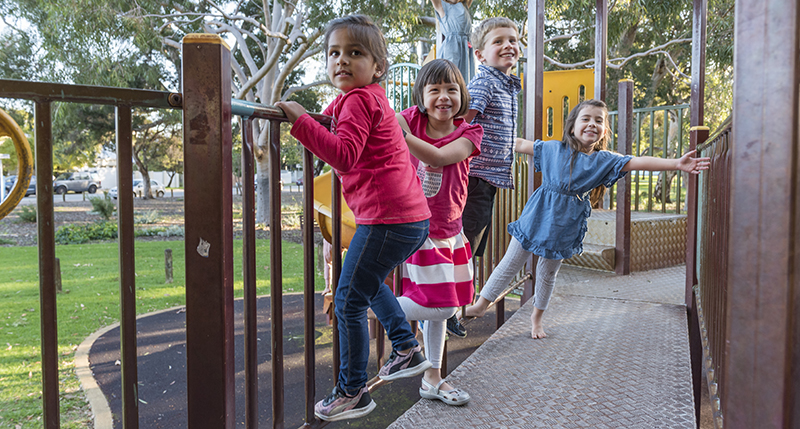Search
Research
Interventions to Improve Child Physical Activity in the Early Childhood Education and Care Setting: An Umbrella ReviewEarly childhood education and care (ECEC) services are a key setting to support improvements in the physical activity of young children. This umbrella review gathered and synthesised systematic review evidence of the effectiveness of interventions in the ECEC setting on the physical activity levels of children aged 0–6.
Research
The ARC Centre of Excellence for Children and Families over the Life Course (Life Course Centre or LCC)The Life Course Centre is a national centre funded by the Australian Research Council Centre of Excellence Scheme and hosted through the University of Queensland with collaborating nodes at the University of Western Australia, Sydney University and University of Melbourne.
Research
Developmental trends in young children’s device-measured physical activity and sedentary behaviourKnowledge of developmental trends in meeting age-specific 24-hour movement behaviour guidelines is lacking. This study describes developmental trends in device-measured physical activity and sedentary time over a three-year period among Western Australian children aged two to seven years, including differences between boys and girls.
Research
A great way to bring up health behaviour topics at playgroup: a qualitative evaluation of the Healthy Conversations @ Playgroup programThe early years is a critical stage to establish optimal nutrition and movement behaviours. Community playgroups are a relaxed environment for parents with a focus on social connection and supporting parents in their role as 'First Teachers'. Playgroups are therefore an opportunistic setting to promote health behaviours in the early years.
Research
Social support helps protects against depressed mood in adolescenceThe goals of the current study were to identify different trajectories of sadness from Grade 6 to 9 in Australian school students, and to explore the role that social support from school, teachers, friends and families play in supporting students’ mental health.
Research
Interpregnancy intervals and child development at age 5: A population data linkage studyTo investigate the associations between interpregnancy intervals (IPIs) and developmental vulnerability in children's first year of full-time school (age 5). A retrospective cohort study using logistic regression. ORs were estimated for associations with IPIs with adjustment for child, parent and community sociodemographic variables.
Research
Association between preschooler movement behaviours, family dog ownership, dog play and dog walking: Findings from the PLAYCE studyPhysical inactivity in childhood is a major public health issue. Dog ownership has been widely reported to lead to greater physical activity in adults and school-aged children. We examined if dog ownership and dog-facilitated physical activity were associated with higher physical activity in preschoolers. Secondary analysis of the 'Play Spaces & Environments for Children's Physical Activity' (PLAYCE, 2015-2018) study involving 1366, 2-5-year-olds from 122 long day-care centres in Perth, Australia was conducted.

News & Events
Top reasons why you should consider joining a playgroupWe have all heard of the phrase ‘it takes a village to raise a child’ but unfortunately in contemporary western society that ‘village’ can be hard to find.
Research
Evaluating the effectiveness of the Play Active policy intervention and implementation support in early childhood education and care: a pragmatic cluster randomised trial protocolDaily physical activity is critical during the early years of life for facilitating children's health and development. A large proportion of preschool children do not achieve the recommended 3 h of daily physical activity. Early childhood education and care (ECEC) services are a key setting to intervene to increase physical activity. There is a significant need for ECEC specific physical activity policy, including clearer guidelines on the amount of physical activity children should do during care, and strategies for implementation of these guidelines.
Research
Traffic exposure, air pollution and children's physical activity at early childhood education and careA significant number of children attend Early Childhood Education and Care (ECEC). ECEC is an important environment and behaviour setting for young children. Time spent outdoors is positively associated with children's physical activity levels, yet increased time spent physically active outdoors may expose young children to traffic-related air pollution, particularly in ECEC centres located in high traffic areas.
